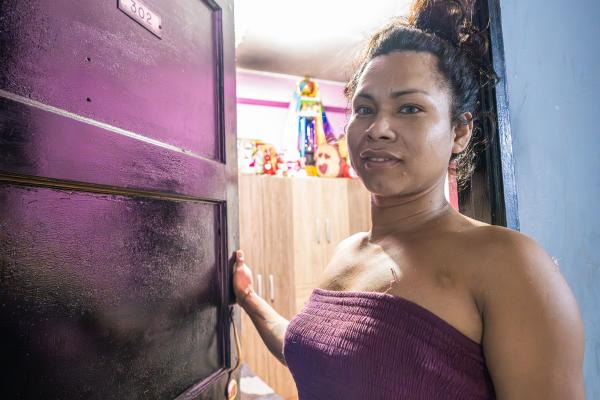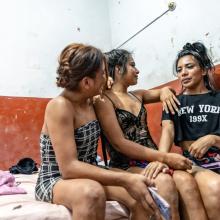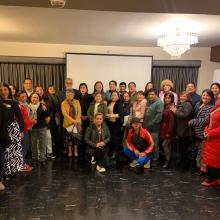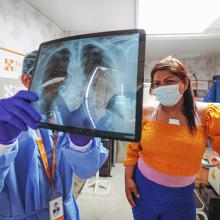Azul, as she prefers to be called, was 12 years old when she fled her native Leticia, Colombia. Rejected by her family for openly living her transgender identity, she crossed the border to Iceland, a small town in Loreto, Peru.
“I didn’t finish my elementary school,” she recalls. “I couldn’t go to Santa Rosa de Yavari, because my dad and mom knew the whole area.” From that first escape, his life was a succession of departures, city changes and fragile restarts.
Before leaving altogether, Azul managed to study a styling workshop in Tabatinga, Brazil, where there was less discrimination against trans people. But every day she had to cross the river that separates this country from Peru to attend classes. The effort was unsustainable and she had to drop out of the course. More than ten years have passed since then and the dream of being a stylist is still there, intact.
Today, Azul lives in a large house in downtown Lima with other trans women. Accompanied by her rabbit Frito, she reconstructs her life while recalling the long journey that brought her to this shelter. It was also in Lima where she met Socios En Salud (SES) and began participating in Juntrans, a community intervention that offers her a safe space to learn, take care of herself and project her dreams.
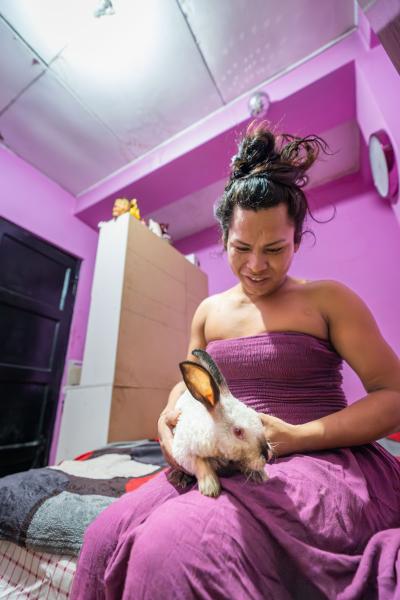
Azul sostiene a su conejo Frito, quien la acompaña durante su día a día en «El Muro», caso del Centro de Lima donde reside.
Foto de Diego Diaz / SES
A workshop where learning is also healing
“I started in the kitchen, washing dishes, I have been a waitress. I have encountered discrimination and, above all, exploitation. What can I say if you work more than seven hours and get paid less than minimum wage,” Azul recounts.
Faced with a lack of formal labor options, she ended up opting for sex work on the streets, as is the case with about 62.2% of transgender people in Peru, according to the Ombudsman’s Office. “When one dedicates oneself to this there are no fixed hours. Sometimes you go out on a Saturday and there is nothing; then you go out on a Sunday,” he says.
This is where Juntrans, SES’s community intervention, seeks to open up new possibilities. Through job-skills workshops, it provides alternatives for trans women facing socioeconomic barriers. So far, 33 participants have found in these trainings a space to learn, share and project their dreams.
“Beyond learning how to make bracelets or bracelets, I go there to talk, meet and listen to the girls,” says Azul. There she shares experiences with women of different ages, learns strategies to face personal challenges and builds new support networks. “Here I have learned to know how to cope and listen,” she reflects. Conversations with older women have taught her patience and emotional control.
In 2024, 353 trans women accessed free HIV and syphilis testing as part of this initiative.
A comprehensive health and life model
The workshop runs parallel to the Mutual Aid Group (GAM), led by a psychologist. “We seek to strengthen self-care, adherence to HIV treatment and job skills,” explains Carla Rodriguez, project coordinator. The combination makes it possible to work on physical and emotional health and build bonds of solidarity among the participants.
For Azul, this therapeutic space has been a refuge in difficult times. “Some time ago I was going through a family problem with a brother and there was no one to talk to… It’s easy to stay locked up or go outside, but you need to unburden yourself to someone prepared who can encourage you, whatever it is you carry inside,” she confesses.
Azul arrived at the program accompanied by a peer educator from the SES HIV and STI program. There, she received accompaniment to receive medical checkups at public health facilities and was able to resume her treatment for comprehensive care.
In 2024, 353 trans women accessed free HIV and syphilis testing as part of this initiative, while 41 received socioeconomic support to ensure their adherence to treatment. “Many of us are uneducated, we don’t know how to express ourselves or have the courage to approach a health center. At SES they support and accompany us,” Azul explains.
“This space allows them to imagine alternatives,” says Rodríguez. Learning a trade opens up the possibility of thinking about small ventures, like the one Azul longs for: opening her own beauty salon, that dream postponed since adolescence that sometimes seems attainable again.
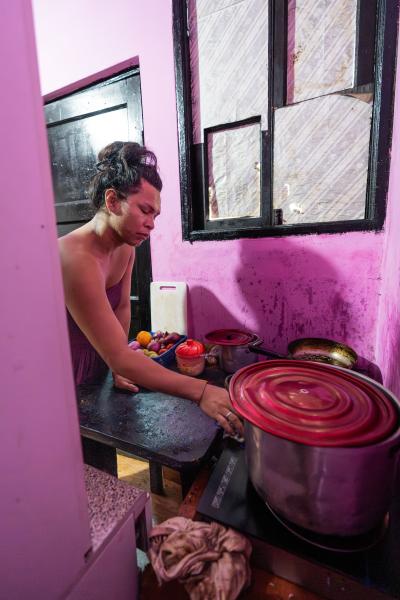
En el interior de su cuarto, Azul se prepara para enfrentar otro día. Socios En Salud la acompaña en este proceso.
Foto de Diego Diaz / SES
Juntrans: accompaniment that transforms
For Azul, each workshop is an opportunity to continue learning and, above all, to weave a network of support that allows her to project herself forward. With Frito at home, her dreams of entrepreneurship and the security of having a safe space, she continues to build her path day by day.
Juntrans’ accompaniment shows how access to health, self-care and job skills can go hand in hand to transform lives. Azul is testament to this: with each workshop, she strengthens her well-being and expands her opportunities in a society where trans women still face enormous challenges.
